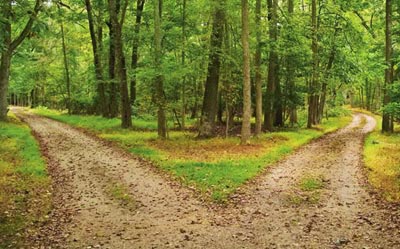
Pages 196-208
A reading route prepared by Paul, Alison, Owen (FLAC only)
The Road Not Taken (by Robert Frost)
Two roads diverged in a yellow wood,
And sorry I could not travel both
And be one traveler, long I stood
And looked down one as far as I could
To where it bent in the undergrowth;
Then took the other, as just as fair,
And having perhaps the better claim,
Because it was grassy and wanted wear;
Though as for that the passing there
Had worn them really about the same,
And both that morning equally lay
In leaves no step had trodden black.
Oh, I kept the first for another day!
Yet knowing how way leads on to way,
I doubted if I should ever come back.
I shall be telling this with a sigh
Somewhere ages and ages hence:
Two roads diverged in a wood, and I—
I took the one less traveled by,
And that has made all the difference.
“Oftentimes, when you and A walked along Chongjian Avenue, the oldest street, you looked all around as you went down the stone steps. Every little alley you crossed made you feel as if you’d missed an opportunity and would live to regret it. Then there were streets on which A had lived…” 177.
「木屋如此叫人爱不释手难以择的町路在你生长的城市曾经也不少,你们就往往走在最老的重建街上,边下石阶边左顾右盼,每一条交叉而去的渺远小巷都让你们觉得错失了不知会是多大的遗憾,还有A住过的那些云和街。。。」178.

[/et_pb_vertical_timeline_item][et_pb_vertical_timeline_item title=”Stop 2″ use_read_more=”off” animation=”off” text_font_select=”default” text_font=”||||” headings_font_select=”default” headings_font=”||||” use_border_color=”off” border_style=”solid”]
“Neither of you ever had a chance to learn if it’d be fun to be gay. You were too busy; in the space of a year or two, the emotions stirred up inside and all those tears that weren’t necessarily shed in sadness constituted a great deal more than the sum total of what you would experience over the next twenty years.” 113.
「你们从来没机会知道同性好不好玩,太忙了,一两年间的事儿,所动用的情感和不一定是伤心才掉的眼泪远远超过其后二十年的总和。」135.
[/et_pb_vertical_timeline_item][et_pb_vertical_timeline_item title=”Stop 3″ use_read_more=”off” animation=”off” text_font_select=”default” text_font=”||||” headings_font_select=”default” headings_font=”||||” use_border_color=”off” border_style=”solid”]
“You had no idea when the incessant longing for far-away places, the desire to go on a long trip, to fly far and high, first came to you… You never tried to deal with this feeling, nor did you dare mention it to anyone, especially since there were always people who wanted to know whether or not you loved this place, even wanted you to hurry up and leave if you didn’t.” 134.
「你简直不明白为什么打那时候起就从不停止地老有远意、老想远行远走高飞、其实你不曾有超过一个月以上时间离开过这海岛。。。你从未试图整理过这种感觉,你也不敢对任何人说,尤其在这动不动老有人要检查你们爱不爱这里,甚至要你们不喜欢这里的就要走快走的时候。」149.
[/et_pb_vertical_timeline_item][et_pb_vertical_timeline_item title=”Stop 4″ use_read_more=”off” animation=”off” text_font_select=”default” text_font=”||||” headings_font_select=”default” headings_font=”||||” use_border_color=”off” border_style=”solid”]
“Since you couldn’t read the Japanese script in the guidebook, you didn’t know if the restaurants had been there before or were there now, but like the last time you visited the area, you chose not to go see for yourself.” 197.
「你看不懂平假名部分,不知它是说以前或现在有这些店,你仍像最后一次来此一样,不愿涉足其中。」192.
[/et_pb_vertical_timeline_item][et_pb_vertical_timeline_item title=”Stop 5″ use_read_more=”off” animation=”off” text_font_select=”default” text_font=”||||” headings_font_select=”default” headings_font=”||||” use_border_color=”off” border_style=”solid”]
“Given your complex, even confused state of mind, you decided not to follow the guidebook’s suggestion to visit the old sites of Kōkaidō Hall or the Provincial Yamen.” 199.
「如此复杂混乱的心情,你不再循书上建议去寻访公会堂或布政使司衙门旧迹,也过巡抚衙门迹、就台湾总督府南警察署不停。」193.
[/et_pb_vertical_timeline_item] [/et_pb_vertical_timeline]
Stop 1
Our reading route reflects on the meaning of Chu’s writing through the lens of Robert Frost’s poem, “The Road Not Taken.” A close reading of Frost reveals regret as a central theme of the poem; what could have happened if I’d taken the other road? This passage addresses this theme fairly directly through symbolism: “Every little alley you crossed made you feel as if you’d missed an opportunity and would live to regret it” (177). Chu’s novella is full of such language, where the narrator reflects on days gone by and is haunted by what could have been if she had made different choices.
Stop 2
We chose this passage because it most overtly addresses the relationship between the narrator and her friend, A. Specifically, it reflects on the difference between the two years of the narrator and A’s friendship and the next twenty years of the narrator’s life. In line with Frost’s poem, it seems to regretfully ask “what could have been different?” The narrator feels that the emotions of those two years were greater and more consequential than anything that happened in the next twenty years without A. This sentiment, combined with A’s earlier musing “Wonder if it’d be fun to be gay” (113) suggests that some of the narrator’s regret stems from wondering what could have happened if they had a different relationship; whether this means just a closer relationship that endured or a romantic relationship is unclear to us.
Stop 3
Throughout “The Old Capital”, it is as if the narrator is split between conflicting identities. The theme of this passage is that she is torn between the reality she has now and the potential life she could live. It is something difficult to deal with because it is related to belonging, and where one fits in. The unidentified people try to make her choose between living her reality and following her fantasy. This passage ties into the themes of Frost’s poem because both acknowledge the difficult decision of which path to follow in life.
Stop 4
At this point in the novella, the narrator has returned from a visit to Japan where she intended to meet with A, but A never showed. Returning to Taipei, the narrator joins a Japanese tour group on a whim. This allows her to re-examine old locations from a new perspective, and through that symbolically re-examine choices she made or could have made earlier in life. Such re-examination is aided by her not knowing how to read the map, which resulted in having to choose again whether to go certain places or not.
Stop 5
The reason we chose this passage is similar to our reason for choosing Stop 4: it displays the author’s symbolic re-assesment of her past in Taipei and what could have been. In this instance, the artificial foreigness of Taipei is indicated through utilizing the Japanese names for locations such as Kōkaidō Hall when translated.
